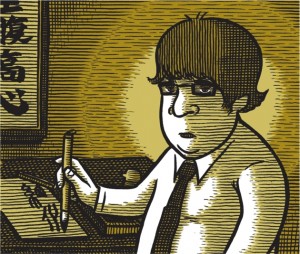Sake World e-newsletter by John Gauntner (January 2011)
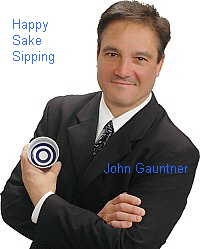 The January 2011 issue of the Sake World e-newsletter by JET alum and the leading non-Japanese sake expert in the world, John Gauntner (a.k.a. “The Sake Guy”), is now available online. In this issue:
The January 2011 issue of the Sake World e-newsletter by JET alum and the leading non-Japanese sake expert in the world, John Gauntner (a.k.a. “The Sake Guy”), is now available online. In this issue:
1. Greetings
2. The Suffix “-shu”
3. Announcements and Events: Sake professional course in Japan
4. Sake Education Central
Additional links:
JET alum shares perspectives of Japan in Metropolis magazine
 JET alum Mark Flanigan (Nagasaki 2000-04) wrote to JetWit to share his writing “debut” in Tokyo, featured in Metropolis Magazine. Following his stint in Nagasaki, Mark returned to Japan as a Rotary International World Peace Fellow at International Christian University (ICU) / 国際基督教大学 in Tokyo. He says:
JET alum Mark Flanigan (Nagasaki 2000-04) wrote to JetWit to share his writing “debut” in Tokyo, featured in Metropolis Magazine. Following his stint in Nagasaki, Mark returned to Japan as a Rotary International World Peace Fellow at International Christian University (ICU) / 国際基督教大学 in Tokyo. He says:
I am very happy and also humbled to have been selected to write for such a great magazine. In my article, I talk about some of the different impressions I have found here, as a JET and now as a Peace Fellow, and compare/contrast my feelings of my two different times spent living in Japan.
Click here to read the article, “Found and Lost: Reflections on my two Japans.”
Justin’s Japan: Interview with NEA Jazz Master David Liebman
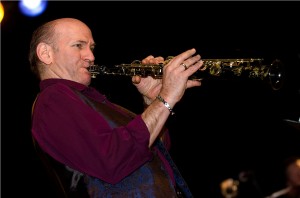
2011 NEA Jazz Master Dave Liebman. (Marek Lazarski, courtesy of the National Endowment for the Arts)
By JQ magazine’s Justin Tedaldi (CIR Kobe-shi, 2001-02) for Examiner.com. Visit his NY Japanese Culture page here to subscribe for free alerts on newly published stories.
Brooklyn-born saxophonist and flautist Dave Liebman is one of this year’s recipients of the NEA Jazz Master Award, which since 1982 is the highest honor the United States bestows upon living jazz musicians. Liebman is best known for his work with the legendary trumpeter Miles Davis, joining his band in 1973 for a 16-month stint and playing on two studio albums, the final ones that Davis would record for the rest of the decade, as well as several live bootleg concerts that are available.
Liebman will appear at a free panel discussion with the other 2011 NEA Jazz Mastersat New York’s Jazz at Lincoln Centeron Jan. 10. (Doors open at 12:45 p.m.)The following night, he will perform at the annual NEA Jazz Masters Awards Ceremony and Concert. For those who can’t attend the sold out show, therewill be a live broadcast on the Newark-based WBGO Jazz 88.3 FM and their website, and Sirius/XM Satellite Radio’s Real Jazz Channel 70. I spoke with the artist about his thoughts on winning this award, his history in Japan, and his intriguing relationship with Miles.
How is one picked to be an NEA Jazz Master?
This is a very good question, which I hope to find out at the ceremony [laughs]…I think past inductees are a part of it—I have no idea. I can’t wait to know, assuming they will tell me the process.
Did you have to campaign for it?
Absolutely not; this was a phone call that came out of nowhere. I think my boss at the Manhattan School of Music, Justin DiCioccio, said he recommended [me], but the truth is, if you go to the site right now, you can put yourself in…the public is free to nominate anybody on the website. So that’s all I know about the process. How it goes from there to deciding [the inductees], I don’t really know, and I’m curious to find out.
You’ve played with Japanese artists and appeared on their albums since the early ’70s. How did that come about, and what were your impressions from visiting Japan through the years?
Of course, I had a lot of action in the ’70s and into the ’80s, but not so much in the last 10 to 15 years. First of all, the Japanese audience at that time was fantastic, and of course Miles Davis was a gigantic hero. The fact that I was with Miles put me right away into a special arena, and sure enough as soon as I got there I recorded. When I was on my first tour with Miles in Japan—it was the only time I went with Miles to Japan—I recorded my first record as a leader [First Visit, with Jack DeJohnette, Richie Beirach and Dave Holland], because Stan Getz’s group was there and the rhythm section was ready to go. I recorded with Abbey Lincoln also that week. In those days, when you went to Japan somehow you ended up with record dates. They were very, very enthusiastic, and business was good.
And then I had, of course, a long-term relationship with Terumasa Hino, the trumpet player, and drummer Motohiko, his brother who passed away a few years ago. I worked many times with the Hinos in Japan at a lot of festivals. Most notably there were two big concerts that I did in the ’80s—one for John Coltrane with Wayne Shorter and then in the ’90s with Michael Brecker, again for Trane ten years later. But as I said, not so much in the last ten to fifteen years. It was fascinating how deep the Japanese audience got into the music and how enthusiastic they were. But it seems to have faded, from what I understand. This generation is not as interested as before. So I can’t speak about the present jazz situation there, but I certainly enjoyed my visits.
Why do you think the Japanese had such an interest and enthusiasm for jazz?
I don’t know. I think they were fascinated by anything American, first of all. They probably loved Dolly Parton, or Sting, or whomever. I think they really liked Western culture. They were fairly prosperous during that period and when prosperity comes, people have more time to do leisure activities, enjoy culture and arts and so forth.
I think the Japanese temperament in general, the arts of Japan—everything from the sword stuff to the tea ceremony to the kimonos to the shakuhachi—they’re a really high class, sophisticated culture; that’s part of their being. And jazz, being as sophisticated as it is appealed to them. I think that’s part of what made them like it more than other cultures in Asia for example. I don’t see China—although we don’t know yet—embracing it the way Japan did, just from the difference of their M.O., the way they are as people. Japan is culturally kind of like the equivalent in Europe of the Germans, who are also very musically sophisticated and are really the best audience to play for as far as educated goes.
When was the last you played in Japan?
I think 2004 or ’05, we did a festival in Kyoto celebrating the history of the city; it was a special festival and I played with my regular working group of the last twenty years. I think that was the last time. You know, in general they just really appreciate art.
Read the rest of the interview here.
WITLife is a periodic series written by professional Writer/Interpreter/Translator Stacy Smith (Kumamoto-ken CIR, 2000-03). She starts her day by watching Fujisankei’s newscast in Japanese, and here she shares some of the interesting tidbits and trends together with her own observations.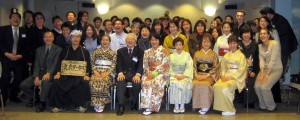
Last night I attended the shinnenkai for New York’s very own Battenkai, or group for Kyushu people (Batten comes from Kyushu-ben and means but, and kai means gathering). There are several kenjinkai or prefectural groups here in the city, but Kyushu has this joint group instead of individual ones for each prefecture. I have been attending their events since two summers ago, and it is always a diverse mix of people. You can find accountants, jazz singers, lawyers, graphic designers and karate instructors, all of whom have interesting stories to share.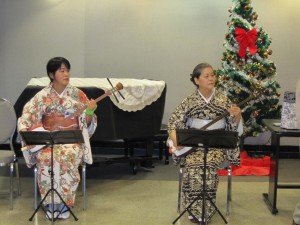
Battenkai gatherings always include some form of entertainment, and last night’s was no exception. It featured several different acts to welcome the new year. First we were regaled by a beautiful shamisen performance by Read More
Foxhound87: New Year’s
Joshua Small is a First Year JET currently living in Ikaruga-cho, Nara-ken and has been chronicling his experience on his blog Snorlax87.
I arrived back from my trip home just in time to celebrate New Year’s in Japan! There is a lot going around New Year’s in Japan. After dinner on December 31st, a friend and I settled in to watch all the magical TV programs. There are two shows, that I’m aware of, that are shown specially on the 31st of December.
Show 1: Kōhaku Uta Gassen (“Red vs White singing contest”)
“Popular singers (and singing groups) split into two teams, women in the red team and men in the white, which then alternate while competing for the audience’s heart throughout the evening. At around 11:30 pm, the final singer (or group) sings, and the audience and a panel of judges are asked to cast their votes to decide which team sang better. The winning team gets a trophy and “the winners’ flag.” The program ends at about 11:45 pm.”
-http://satoh490625.blog50.fc2.com/blog-entry-781.html
This show was really fun to watch. I got to watch all the popular artists in Japan including Arashi and Ikimono Gakari. These two groups are INSANELY popular here. In addition to pop music, some traditional singers are also invited to the contest. One enka singer was dressed like a glamorous baby crane. I looked away from the television for a moment. When I looked back, she was RIDING A GIANT CRANE complete with flapping wings. I wish I had a picture of my reaction. It was priceless. By the way, the white team won. Guy power!
CLICK HERE to read the rest of the post.
http://snorlax87.blogspot.com/
JET alum/cartoonist Lars Martinson gives radio interview
Check out this great radio interview with JET alum/cartoonist Lars Martinson (Fukuoka-ken 2003-2006), creator of the four-part graphic novel Tonoharu. Lars talked with radio station KFAI out Minnesota in December. Hear him talk about the creation of his book, which tells the tale of an ALT wrestling with the challenges of living in rural Japan (sound familiar, anyone?). Lars lived in rural Fukuoka for three years and spent several years post-JET crafting the novel based on his experiences.
For those who are interested, Tonoharu Part I and Part II (which just hit book shelves in November) can be found here:
Also be sure to check out JetWit’s recent interview with Lars Martinson.
Foxhound87: I. AM. SANTA.
Joshua Small is a First Year JET currently living in Ikaruga-cho, Nara-ken and has been chronicling his experience on his blog Snorlax87.
On December 14th, I became the embodiment of joy and happiness in the world. I became Santa Claus. I was told weeks before that I would being playing Santa Claus for a local kindergarten. Soon after, my Kyoto Sensei told me that another kindergarten had requested my thespian skills. That’s right, I was in high demand.
The morning of the 14th, my Kyoto Sensei picked me up from school and we traveled together to the first kindergarten. We were greeted by a very nice lady who escorted us into the conference room. She gave me the costume (including eyebrows and beard), then left to let me change. The costume fit fine. It was the beard I was struggling with. It would not stay above my ACTUAL beard. I worried that the kids might see my brown beard beneath the costume…and Christmas would be ruined. I went over my lines for the show one more time, drank some hot tea, and mentally prepared myself for what was about to come…
CLICK HERE to read the rest of the post.
http://snorlax87.blogspot.com/
Job: P/T Bi-lingual Accounting Clerk (Pennsauken, NJ)
via the Japan America Society of Greater Philadelphia. Posted by JET alum Gail Cetnar Meadows (ALT, Hiroshima-shi 2007-10).
*Note: If you apply for this position, please let them know you learned of it from JetWit. Thanks.
Job Position: Bi-lingual Accounting Clerk
Job Description:
Subaru of America has a temporary part-time accounting clerk positin open in the Fuji USA (FUSA) department located at 7041 North Park Drive in Pennsauken, NJ.
This position is 25 hours per week for about two months. Subaru is looking for a Japanese/English bi-lingual candidate with accounting experience and a thorough knowledge of Quickbooks accounting software. The candidate must be totally fluent in Japanese. The person would support the General Manager of FUSA, manage both U.S. and Japanese payroll, handle invoices from outside vendors and assist the General Managers with budget preparation. This opening is immediate and the salary is negotiable.
How to apply: Send resumes as soon as possible to Pamela E. Epps at pepps@subaru.com.
See the original posting on the Japan America Society of Greater Philadelphia website here.
Job: Japanese Copywriter (Remote position)
via the Japan America Society of Greater Philadelphia. Posted by JET alum Gail Cetnar Meadows (ALT, Hiroshima-shi 2007-10).
*Note: If you apply for this position, please let them know you learned of it from JetWit. Thanks.
Job Position: Japanese Copywriter
Job Description:
- This position entails writing short blog entries (approximately 450 to 500 characters) about every day, personal PC issues.
- Incorporate keywords that will be provided (usually 3 to 5, but may vary at times).
- Work with the coordinator to develop a stylistic voice.
- Follow general guidelines/instructions provided by the coordinator.
- Research and familiarize oneself with PC issues and news.
Requirements:
- Must be fluent in Japanese (written and verbal).
- Must be able to submit 20 articles per month.
- A positive attitude and professional demeanor are also required.
- Good understanding and knowledge of Japanese media and culture is a plus.
- This is a project-based/part-time job, where you can work from home or anywhere else as long as you have a reliable internet connection.
For more information: http://jasgp.org/content/view/817/132/
How to Apply: Send your resume in a Word doc format to hlee@ascentive.com
Japan America Society Roundup 1.5.11
JET alum Gail Cetnar Meadows (ALT, Hiroshima-shi 2007-10), co-founder of Hiroshima JET webzine the Wide Island View, shines a light on some of the upcoming events of Japan America Societies…
 11th Annual Mochitsuki New Year’s Celebration — Celebrate the New Year Japanese style with demonstrations of mochitsuki (pounding sweet rice with a mallet and mortar to make rice cakes) and sample the end result with anko, kinako, nori, or Sendai’s special zunda-mochi. The afternoon will feature live performances by taiko drummers, a children’s choir, traditional Japanese dancers and a kimono demonstration. Other activities include New Year’s games for children, origami, calligraphy, and ikebana. Cost is $8 for non-members, $5 for members, $2 for children aged 6 to 12 years, free for children ages 5 and under.
11th Annual Mochitsuki New Year’s Celebration — Celebrate the New Year Japanese style with demonstrations of mochitsuki (pounding sweet rice with a mallet and mortar to make rice cakes) and sample the end result with anko, kinako, nori, or Sendai’s special zunda-mochi. The afternoon will feature live performances by taiko drummers, a children’s choir, traditional Japanese dancers and a kimono demonstration. Other activities include New Year’s games for children, origami, calligraphy, and ikebana. Cost is $8 for non-members, $5 for members, $2 for children aged 6 to 12 years, free for children ages 5 and under.
- Date: Sunday, January 16
- Time: 2 to 5 p.m.
- Place: Fujitsu Network Communications, Inc., 2801 Telecom Parkway, Richardson, Texas 75082
- For more information, click here.
- Contact: info (at) jasdfw (dot) org or 214-342-2022
- Pittsburgh Sushi Experience — How’s a resolution to try more sushi sound? In 2011, the JAS of Pennsylvania will visit four Pittsburgh sushi restaurants. The first gathering will be at the trendy Penn Avenue Fish Company, where you can sample fusion sushi and a host of other aquatic offerings. Be sure to bring your business card to participate in a drawing for a gift card.
- Date: Thursday, Jan. 20
- Time: 7 p.m.
- Place: 308 Forbes Ave. (near Honus Wagner), downtown Pittsburgh
- For more information, click here.
 Speaker Series Presentation — Dr. William R. Farrell will give a presentation titled “From Black Ships to a Black President: Images and Reality in US-Japan Relations.” Using wood block prints, post cards and political cartoons, he will take the audience on a lively tour through history, viewing events such as Commodore Perry’s arrival, the road to Pearl Harbor, World War II, the Occupation, trade wars and the current international situation.
Speaker Series Presentation — Dr. William R. Farrell will give a presentation titled “From Black Ships to a Black President: Images and Reality in US-Japan Relations.” Using wood block prints, post cards and political cartoons, he will take the audience on a lively tour through history, viewing events such as Commodore Perry’s arrival, the road to Pearl Harbor, World War II, the Occupation, trade wars and the current international situation.
- Date: Thursday, Jan. 27
- Time: JASGC annual meeting at 5 p.m. Speaker presentation at 5:30 p.m.
- Place: Taft Center, 425 Walnut St., Cincinnati
- For more information, click here.
Does your Japan America Society have an upcoming event that you’d like to share with JetWit readers? Email the info to Gail at gail (at) jetwit (dot) com.
Sukiyaki Survey: Can you get a raw egg at Japanese restaurants in the U.S.?
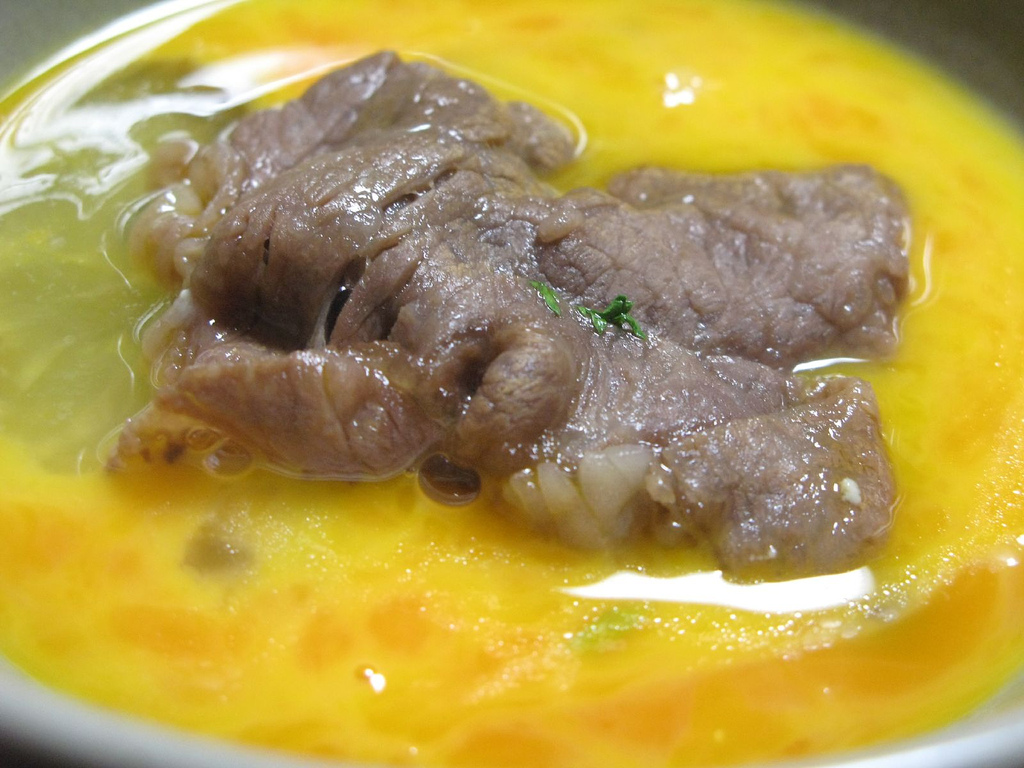 Will Japanese restaurants in the U.S. give you a raw egg for sukiyaki or gyudon or other purposes?
Will Japanese restaurants in the U.S. give you a raw egg for sukiyaki or gyudon or other purposes?
In my limited experience, they won’t offer it on the menu, I believe due to health code restrictions. But my understanding is that if you ask for it, they’ll give it to you.
Does anyone else have any perspective or experience with this? Have you obtained one successfully? Been denied?
Please share your responses in the comments section of this post.
Yoroshiku!
Job: Housesit a Remote Tropical Home (Palau)
 Stephanie Boegeman (ALT, Akita-ken, 2006-09) gets her kicks from finding fun crazy ways to see the world and getting paid to do it. She is constantly in search of job, internship, and travel ideas to add to her site Playing With Hire, in the hopes that more JET alumni and like-minded souls join her in her quest to find creative, inspiring, and unique ways to make ends meet.
Stephanie Boegeman (ALT, Akita-ken, 2006-09) gets her kicks from finding fun crazy ways to see the world and getting paid to do it. She is constantly in search of job, internship, and travel ideas to add to her site Playing With Hire, in the hopes that more JET alumni and like-minded souls join her in her quest to find creative, inspiring, and unique ways to make ends meet.
If you’re up for living off-the-grid on a remote island for free, a sweet year-long housesitting gig is immediately available in Palau. Just like JET, you’ll be expected to maintain good relationships with everyone else on the island while living in a fishbowl. More details can be found here.
WIT Life #146: 明けましておめでとうございます!
WITLife is a periodic series written by professional Writer/Interpreter/Translator Stacy Smith (Kumamoto-ken CIR, 2000-03). She starts her day by watching Fujisankei’s newscast in Japanese, and here she shares some of the interesting tidbits and trends together with her own observations.
A big akemashite omedetou gozaimasu to everyone! 今年もよろしくお願いいたします。 I hope everyone had a good end to the year and that you are feeling ready for the Year of the Rabbit that we have now entered. I spent the night of 元旦 (gantan) or New Year’s Day with co-workers from the Japanese restaurant that I used to waitress at, and we enjoyed osechi ryouri in lacquer boxes and bowls of ozouni as we watched 紅白歌合戦 (kouhaku uta gassen) or the Red and White Singing Contest. The white or men’s team won for the 6th consecutive year with a healthy margin of over 50,000 votes.
Aside from the usual vapid J-Pop and classic enka, I was really struck by singer Kana Uemura’s トイレの神様 (toire no kamisama), or The Toilet Goddess. This acoustic ballad is a whopping almost ten minutes long, and it tells the story of Read More
Job: Shinjo Ito Postdoctoral Fellowship in Japanese Buddhism (Berkeley)
.
Via Shinpai Deshou, an online resource to help Japanese Studies majors figure out how to make a living doing what they love:
The Center for Japanese Studies at UC Berkeley is offering a one-year postdoctoral research fellowship, starting July 1, 2011. Fellows receive a stipend of approximately $40,000 plus benefits. The deadline for applications is February 15, 2011. Additional information on the fellowship can be found here.

